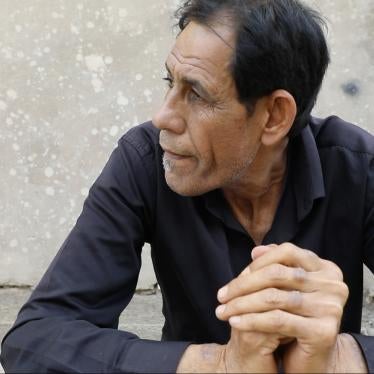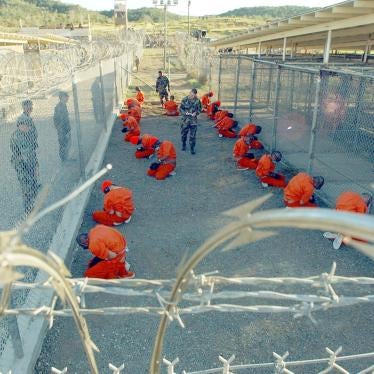Human Rights Watch reports on the hearings for Ali Hamza Ahmad Suliman al-Bahlul before the military commissions at Guantanamo Bay.
The hearings for Ali Hamza Ahmad Suliman al-Bahlul Bahlul before the military commissions at Guantanamo Bay were supposed to have some gravitas. Bahlul, who is charged with conspiracy to commit murder and terrorism, is alleged to have been Osama bin Laden's media director and reportedly prepared the videotaped will of 9/11 ringleader Mohammed Atta.
To differentiate him from the other detainees who have gone before the military commissions, Bahlul's hearing was the first to take place in the newly-constructed $12 million courthouse the military erected to try terrorism suspects here.
But if the US government wanted solemn proceedings, it got nothing of the sort.
Bahlul, who is 37 and has close-cropped dark hair and a full beard, refused to sit with his assigned defense counsel or interpreter and promptly announced that he didn't plan to participate in his trial by waving a handwritten sign above his head that read "boycott" in both Arabic and English.
The military judge, Col. Peter Brownback, asked Bahlul if he would like to make a statement, and the accused began speaking, but the audio equipment malfunctioned, leaving the courtroom observers (who sit behind a wall of bullet-proof glass) and at times those in the courtroom, unable to hear the translation of what he was saying. After two recesses to address the technical difficulties, the power to the courthouse went out. As the lights went down, military guards rushed to surround the accused.
Judge Brownback, by that time no longer sitting on the bench, but on the courtroom floor because his microphone had malfunctioned, was clearly frustrated by the delays and technical problems and ordered the court to wrap up proceedings in the dark.
In between technical glitches, Judge Brownback tried to ascertain whether or not Bahlul wanted to boycott in total (in which case the rules of the military commissions allow proceedings to take place without him) or if he wanted to represent himself. But Bahlul refused to speak and instead handed the judge three pieces of paper.
Written in large Arabic script, they read: "Decision of rejection of the court," "Decision of continuation of boycott," and "Decision of renewed allegiance to Osama bin Laden."
Judge Brownback ordered the writings entered into the court record and turned to Bahlul's defense counsel, Air Force Major David Frakt, who had been called up from the reserves and assigned to represent Bahlul only 10 days earlier.
"Your honor, Mr. al-Bahlul has asked me not to represent him or make any statements on his behalf or go into your chambers to meet with you," Frakt said.
In 2005, when Bahlul appeared before the first round of military commissions, he indicated then that he wanted to choose a lawyer from Yemen, his home country. That request was denied, because the rules of the military commissions require that defense counsel be an American citizen. Bahlul later said that he wanted to represent himself, a request that was denied at the time.
Under the rules of the new military commissions, enacted by Congress in 2006, the accused are permitted to represent themselves. Brownback explained to Bahlul that Major Frakt was being made available to him, but that he could also request someone else, if that person met the necessary qualifications and was available. In addition, he now had the right to represent himself. The judge then asked Bahlul what he wished to do.
Bahlul stood mute.
When Major Frakt rose to speak, Bahlul waved his hands aggressively, signaling his defense counsel to sit down - a gesture that angered the judge.
"That is not a choice," Brownback said to Bahlul. "If you wish to tell me by whom you wish to be represented, then you will be represented by that person. ... If you stand mute, Major Frakt will represent you and you won't be allowed to make silencing motions."
How Major Frakt is going to represent a hostile detainee who refuses to speak to him is unclear.
In spite of his sign-waving and insistence on not speaking, Bahlul did take the opportunity to address the court when the judge asked if he had anything he would like to say. Waving his finger at the judge, Bahlul spoke for more than an hour. Exactly what he said remains unknown, because the audio feed into the courtroom went down twice and was often interrupted by static and feedback, but some of the highlights included the following:
Bahlul renounced his Yemeni citizenship because Yemen was cooperating with the United States and had thus sworn allegiance to the enemy. "From this position, I announce that I have given up my Yemeni citizenship," he said.
He renewed his allegiance to Osama bin Laden. "Today I say to you that I will never deny that I have participated with Osama bin Laden in fighting you and your allies, the Jews, because I'm looking for a greater day than today," he said. "I am responsible for my actions in this world and in the next world, meaning I don't care if you imprison me or kill me."
He lambasted the United States for "casting aside the rule of law" after 9/11 and said that he would be judged in the court of Allah. "We believe no one has the right to set laws for the people. This right belongs to Allah and the Almighty."
He said he wanted Americans to imagine that one day they would be judged in an Islamic court and that they would then have to pay. "You perceive yourself as the gods, but we believe there is only one God in heaven," he said. "Do not fight Allah by writing laws."
He warned that Muslims around the world would continue to fight America and said that the West was engaged in a clash with the Muslim world. "We see the world from one point of view, you see it from another. ... I'm telling you that the measures of innocence and guilt are different in those two worlds. You think Osama bin Laden is a criminal, but we think George Bush is a criminal."
Bahlul said he didn't care that he was imprisoned in Cuba - for all he cared, the Americans could send him to the moon (though he said he believed travel to the moon never actually happened and was US propaganda), because his Muslim brothers would continue the war against America. "I'm telling you," Bahlul said, "You will be the losers."
He acknowledged that he had worked with Osama bin Laden as his media advisor and said the court would surely turn up evidence and witnesses showing this to be true. "I have no problem with that. Take your legal actions. The war against you shall continue."
Throughout his speech, Bahlul showed that he had a good command of English by occasionally stopping to correct the court interpreter. "No, not American laws, international laws," he chastised once. "Not a tape of 39 minutes, 40 seconds, a tape of 39 or 40 minutes," he corrected another time.
After just over an hour, Judge Brownback interrupted.
"Mr. al-Bahlul, I listened to your discussion and I listened especially to your discussion of innocence and criminality and how it depends on your viewpoint," he said. "But I am not here today to determine innocence or guilt. I'm here to find out certain matters, among them, do you want to represent yourself?"
Bahlul refused to answer the question and raised his "boycott sign" above his head.
Judge Brownback then stated that if Bahlul insisted on boycotting, he could not represent himself, and turned to the defense counsel. "Consequently Major Frakt, you are by default representing Mr. al-Bahlul."
Major Frakt protested, telling the judge that he believed it was the defendant's right to represent himself and not proceed with a defense and that he "would prefer to respect Mr. al-Bahlul's wishes," but it was not to be. Major Frakt was assigned to act as standby counsel.
The prosecution read out the charges against Bahlul, and Judge Brownback asked the accused how he pleaded. Bahlul stood mute.
"Mr. al-Bahlul," Judge Brownback said, "When I asked you how do you plead, you were arraigned. If the future, if you are not present and the judge determines your absence is voluntary, the commissions can and will proceed against you. Do you understand?"
Bahlul again refused to answer and the proceedings were adjourned.
The next hearings are scheduled for June 26-27.








